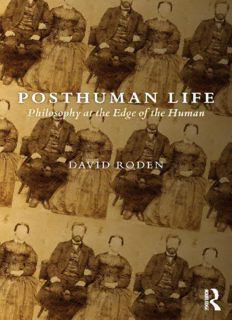
Posthuman Life: Philosophy at the Edge of the Human PDF
Preview Posthuman Life: Philosophy at the Edge of the Human
Posthuman Life We imagine posthumans as humans made superhumanly intelligent or resilient by futureadvancesinnanotechnology,biotechnology,informationtechnologyandcognitive science. Many argue that these enhanced people might live better lives; others fear that tinkering with our nature will undermine our sense of our own humanity. Whoever is right, it is assumed that our technological successor will be an upgraded or degraded version of us: Human 2.0. Posthuman Life argues that the enhancement debate projects a human face onto an emptyscreen. Wedonotknowwhatwillhappenand,notbeingposthuman,cannot anticipate how posthumans will assess the world. If a posthuman future will not necessarily be informed by our kind of subjectivity or morality, the limits of our current knowledge must inform any ethical or political assessment of that future. Posthuman Life develops a critical metaphysics of posthuman succession and argues that only a truly speculative posthumanism can support an ethics that meets the challenge of the transformative potential of technology. DavidRodenisLecturerinPhilosophyatTheOpenUniversity,UK.Hispublished work hasaddressed therelationship between deconstruction andanalytic philosophy, philosophical naturalism, the metaphysics of sound, and posthumanism. This page intentionally left blank Posthuman Life Philosophy at the Edge of the Human David Roden Firstpublished 2015 byRoutledge 2ParkSquare, MiltonPark,Abingdon, OxonOX144RN andbyRoutledge 711ThirdAvenue,NewYork,NY10017 Routledge isanimprint oftheTaylor &FrancisGroup,aninformabusiness ©2015DavidRoden TherightofDavidRodento beidentifiedasauthorofthisworkhasbeen assertedbyhiminaccordancewithsections77and 78oftheCopyright,Designs andPatents Act1988. Allrightsreserved.Nopartofthisbookmaybereprintedorreproducedor utilisedinanyform orbyanyelectronic,mechanical, orothermeans,now knownorhereafterinvented,including photocopyingand recording,orin anyinformationstorageorretrievalsystem, withoutpermissioninwriting fromthepublishers. Trademarknotice:Productorcorporatenames maybetrademarksor registered trademarks,andareusedonlyforidentification andexplanation withoutintenttoinfringe. British LibraryCataloguing-in-Publication Data Acataloguerecordfor thisbookisavailablefromtheBritishLibrary LibraryofCongress Cataloging inPublication Data Acatalogrecordforthisbookhasbeenrequested ISBN:978-1-84465-805-3 (hbk) ISBN:978-1-84465-806-0 (pbk) Typeset inGaramond byTaylor&FrancisBooks To Marika Zeimbekis, life partner and friend. This page intentionally left blank Contents Acknowledgements viii Introduction: Churchland’s centipede 1 1 Humanism, transhumanism and posthumanism 9 2 A defence of pre-critical posthumanism 35 3 The edge of the human 52 4 Weird tales: anthropologically unbounded posthumanism 76 5 The disconnection thesis 105 6 Functional autonomy and assemblage theory 124 7 New substantivism: a theory of technology 150 8 The ethics of becoming posthuman 166 Bibliography 194 Index 209 Acknowledgements Many people have helped directly or indirectly to make this book possible. Special thanks must go to Iain Hamilton Grant for rousing me from my post-analytic stupor over a garrulous dinner back in the 1990s; Christopher Norrisforgentlynudgingmebackintophilosophyduringthesameperiod; andDarianMeachamandR.ScottBakker,whoserecentintellectual support helped get me through the final year. Kudos also to Pete Wolfendale, Levi Bryant and others on the accelerationist and “speculative realist” fringe for illuminating my work with their own critical star shells. Special thanks are due to Clive Cazeaux for kindly reading and commenting on some draft chapters. In much the same vein I must thank Stefan Sorgner, Jelena Juga, Jaime del Val, Milivoje Misha Pantovic, Francesca Ferrando, and all at the Beyond Humanism Network for mixing the exploration of posthumanity with warmth, friendship and fun; current or erstwhile colleagues at the Open University, Cristina Chimisso, Keith Frankish, Alex Barber, Nigel Warburton and Tim Chappell for their consistent interest and encour- agement. I also owe a considerable debt to Tristan Palmer at Acumen whose friendly and engaged editorship made the completion of this project possible. Finally, and above all, I must thank Marika Zeimbekis for her scrupulous reading of the early, inchoate drafts, for challenging me to explain, and for encouraging me to think lives other than my own. Introduction ’ Churchland s centipede Mankind’s a dead issue now, cousin. There are no more souls. Only states of mind. (Sterling 1996: 59) In his autobiography, Bertrand Russell describes witnessing the philoso- pher Alfred Whitehead’s wife, Evelyn, undergoing great physical pain: “She seemed cut off from everyone and everything by walls of agony, and the sense of the solitude of each human soul suddenly overwhelmed me.” Russell portrays this event as akin to a religious conversion. It convinced him that the immense gulf between human beings could only be bridged by selfless love. Having been an imperialist, he was now persuaded that war was wrong and “that a public school education is abominable” (Russell 2009: 137). Maybe not all of us are as profoundly affected by others’ suffering. But Russell’s evocation of our loneliness rings true. Surely the expression “I feel your pain” is a self-serving euphemism. Whatever consolation we offer, it seems, the other’s pain is theirs alone. This melancholy insight is supported by an abstract claim about the privacy of conscious experience that most philosophers and lay people seemtoaccept(Hirstein2012:6–7).EvenifmyempathyisattheRussellian end of the scale, I cannot feel your pain because each experience is unique to the one who has it. Where experiences are qualitatively similar, they are distinct tokens of the same type. I cannot have your experience of hearing Nirvana’s “Smells Like Teen Spirit” on your blue MP3 player, though I might have qualitatively identical sensations listening to a cloned MP3 on my pink player. Things change. We can imagine humans acquiring new technological powers, like the ability to hear dog whistles or withstand the cold vacuum of space. But can we imagine how one could experience the pleasures, pains or thoughts of another? Nothing, it seems, can alter the essential human solitude Russell expresses so eloquently. Well, maybe not quite nothing.
Description: